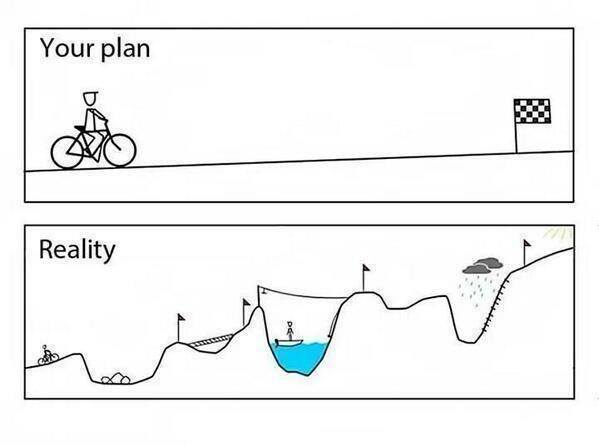
Creative Commons by Doghouse Diaries
People in mindfulness circles love to quote Portia Nelson’s “Autobiography in Five Short Chapters.” It’s a little work of wisdom about the patterns we habitually bring to the challenges in our lives.
We’re all familiar with helplessness, victimhood, and denial of the unpleasant. One of these may be our fallback. That’s why I appreciate this parable — it exposes our own habits and shows how certain ways of coping with the world can be self-defeating. It also points to some better strategies for difficult times. Mindfulness is a big one for me.
My teacher at the New York Insight Meditation Center tells us that there’s at least one more chapter missing from the poem. Can you guess what it is? (*see below)
Autobiography in Five Short Chapters
“Chapter One of My Life. I walk down the street. There’s a deep hole in the sidewalk. I fall in.
I am lost. I am helpless. It isn’t my fault. It still takes forever to find a way out.
Chapter Two. I walk down the same street. There’s a deep hole in the sidewalk. I pretend I don’t see it. I fall in again. I can’t believe I’m in the same place! But it isn’t my fault. And it still takes a long time to get out.
Chapter Three. I walk down the same street. There’s a deep hole in the sidewalk. I see it there. I still fall in. It’s a habit! My eyes are open. I know where I am. It is my fault. I get out immediately.
Chapter Four. I walk down the same street. There’s a deep hole in the sidewalk. I walk around it.
Chapter Five. I walk down a different street.”
* Chapter Six, according to my teacher: “Walking down the new street, there’s a deep hole in this sidewalk too. I fall in.”
It is so true that real self-change can take a long time. Lately I’m finding that solutions appear more quickly when I’m taking time to bring mindfulness into my everyday life. Sometimes that looks like saying to myself, “Am I being mindful right now?” over and over throughout the day. These practices, too, have their own challenges (like remembering to do them, for starters). But they pale in comparison to getting stuck in one of life’s big holes, many of them of my own making.
Here’s my biggest hope. Maybe, maybe someday I will come to embrace the holes that I’ve fallen into — with a sense of humor and kindness to myself and all fellow clumsy beings.






Absolutely fabulous. Read this story by Portia Nelson in an interpersonal communication course I did. It is true what you said about “remembering to be mindful” it takes effort to start with and them becomes a part of you. More power to you!
Chapter 6….What about doing yourself and your community a service by filling in the hole and repairing the sidewalk so no one falls into the hole again. Much better than feeling comfortable being in the hole.
Good thinking, David!
A life or world without potholes…has anyone ever experienced such a life? Will anyone ever experience such a life on Earth, despite all the good intentions and efforts?
You mean rearranging the world around you such that life “perfect”? Good luck with that my friend.🙏🏽
A world where potholes exist (on many levels of existence/many senses of the word) and all beings on Earth always avoid falling into them, would be evidence of perfect beings living in an imperfect world.
A world where no potholes did or ever will exist, would be evidence of a utopia (some might say ‘Heaven on Earth’).
Since potholes do exist and have always existed, and people have fallen and do continue to fall into them (all in the full recollection of human-recorded history), it is reasonable to conclude that:
1. All beings on Earth are imperfect, and
2. The Earth is no utopia (or Heaven on Earth); and
3. It is extremely unlikely that this world (socially, politically, economically, environmentally) will ever be free of faults, and that it’s beings will attain perfection (in any sense of the word) in this temporal existence.
The above conclusions that I have arrived at do not cause me to be angry, cynical, depressed or detached from life. If anything, they inspire me to always search for the good, to do the good and to be the good. Of cause it is right to act with love and compassion and have empathy for others – to help others in need, bring comfort and friendship, and stand against injustices. However, if any of us thinks that we will never fail at times in our quests to evolve; to think that any of us can ever totally eradicate cruelty, pain and suffering from this world – this would only be self-delusion.
We must accept that pain and suffering is an unavoidable part of the human experience – it comes and goes in life. It is how we react to it that really matters. When our responses are less than noble and constructive, we must accept our failings and forgive ourselves and others. The best that any of us can do is to recognise and admit our mistakes or transgressions, take responsibility, make amends and commit ourselves to better decisions and actions in the future.
A little word of caution to those who want to fill in all the potholes: old ones will reopen and new ones will form. Take care when fill you one pothole that you haven’t created another somewhere else for yourself or others to fall into. Also, some people repeatedly dig their own holes and jump into them and wait for another to come and rescue them. Compassion and kindness must be tempered with wisdom and self-care.
Honestly, I simply try to remember the 3 P’s of my Buddhist teachings:
Nothing is Perfect
Nothing is Personal
Nothing is Permanent
It really helps me from getting stuck with the ”second arrow” that comes through that I shoot at myself (i.e., my self limiting narrative of self) after I have fallen in… because I am human all too human and I absolutely WILL fall in! It keeps the pain from turning into suffering 😅